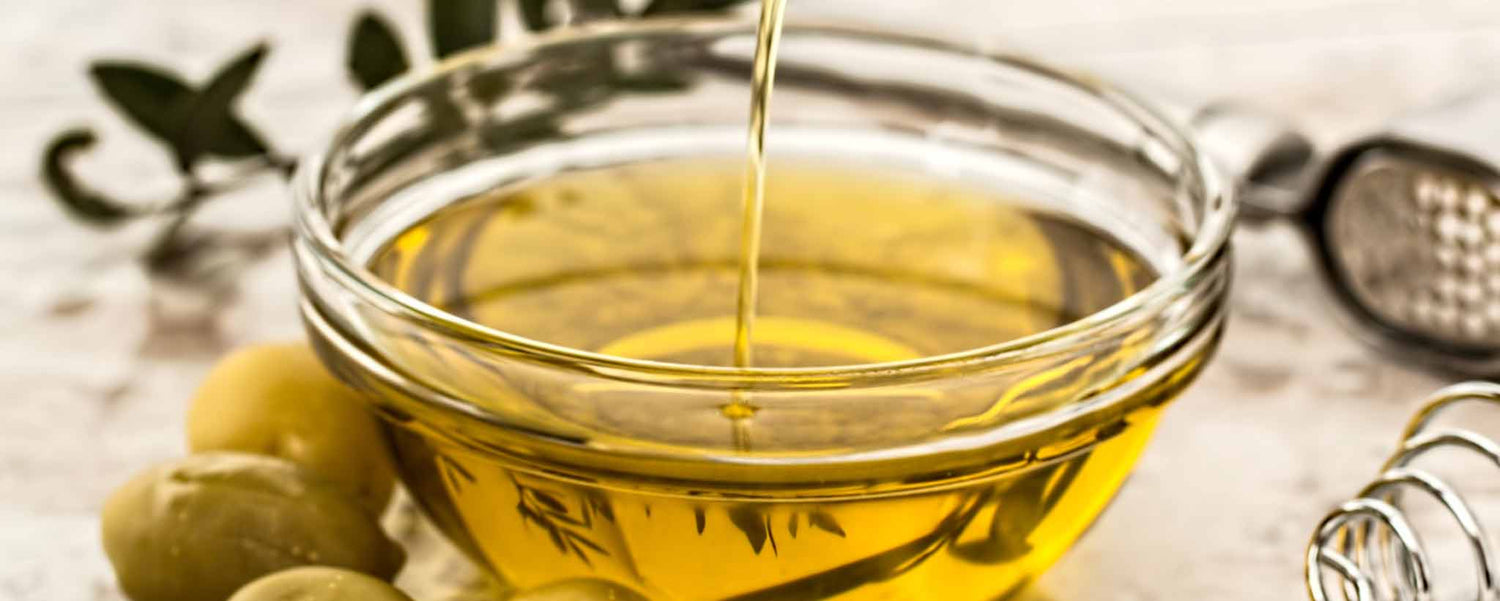People spend much money on creams, serums, and moisturizers that, ounce-for-ounce, cost significantly more than natural ingredients on kitchen shelves.
Dual-Purpose Oils
Experts estimate the value of the skin care products market to be $183.03 billion by 2025. People spend enormous amounts of money on creams, serums, and moisturizers. What often makes them appealing is one or more recognizable natural ingredients. Often, these ingredients are a few aisles away in the same grocery store and, ounce-for-ounce, cost much less.
Now imagine the advantages of shopping for cooking oils and butter with an eye on which ones also benefit your skin. When you get home, you can portion out some for each purpose.
Cocoa Butter
Cocoa butter is a non-dairy stable fat used in both sweet and savory recipes, chocolate, as well as facial and body lotions. Since it has a high smoke point, it is also great to use when searing meat at high temperatures. In addition to moisturizing skin, cocoa butter helps fade blemishes.
Coconut Oil

For skin care, organic expeller-pressed is better than lower-priced refined coconut oil. Manufacturers extract coconut oil from the edible, fleshy “meat” of a coconut. Lauric acid, the predominant medium-chain fatty acid found in coconut oil, has proven antibacterial, antiviral, antifungal, and anti-inflammatory benefits.
Other chemical substances in coconut oil—including phytonutrients and polyphenols—act as antioxidants, and have other tissue-supportive and tissue-protective properties. It’s best to apply coconut oil to your skin in the same inconspicuous area for 3–4 days in a row to see if you have any abnormal reactions to it.
Olive Oil
Although the real nutrition for your skin comes from what you eat, topical application of organic extra-virgin olive oil benefits skin. “While olive oil generally has high safety and low comedogenic ratings, for people with very sensitive, dry, or eczema-prone skin, olive oil can incur further damage to the skin barrier,” according to Ming Zhao, CEO of PROVEN Skincare, which creates custom beauty products. Trying to treat dryness in very sensitive, dry, or eczema-prone skin with olive oil is a flat-out no-go, she says.
Peanut Oil
Individuals with a peanut allergy may also develop an allergic response to peanut oil. When well-tolerated, you can consume peanut oil in foods to lower cholesterol and prevent heart disease and cancer. You might also apply peanut oil on the skin for arthritis, joint pain, dry skin, eczema, and other skin conditions. However, there is scarce scientific evidence to support these uses.
Almond Oil
Almond oil is both a moisturizer and an emollient for dermatitis, eczema, or dry skin. Some people with acne use almond oil as a moisturizer, often alongside topical acne medication. The Food and Drug Administration (FDA) cautions that oil from moisturizers may make acne worse, but some dermatology professionals recommend it for moisturizing. Avoid if you have nut allergies.
Avocado Mask

At-home face masks can be rejuvenating. Here is one good enough to eat from Fit Foodie Finds. It combines fresh avocado, honey, coconut oil, lemon juice, and oatmeal for exfoliation.
- 1 tablespoon rolled oats, coarsely ground
- 1/2 ripe avocado
- 1 teaspoon lemon juice
- 1 tablespoon honey
- 1 teaspoon coconut oil
- 2 drops of your favorite essential oil (optional)
Instructions

- Mash half a ripe avocado in a small bowl with a fork until smooth.
- Pulse rolled oats in a food processor to coarsely grind. Then mix it with the mashed avocado.
- Blend in lemon juice, honey, coconut oil, and essential oils.
- Apply a few tablespoons to your clean face immediately and let sit for 15–20 minutes.
- Rinse off with warm water, pat dry, and follow up the mask with your favorite facial oil.
Wrap Up
You may find that alternating or mixing some of the above oils achieves the best benefit. Always test on a small, inconspicuous area before slathering on your entire face or arms. Maintain hygienic barriers between oils for cooking and skin care. Separate a portion to use in your medicine cabinet from your kitchen cabinet.
The value of boutique skin care products is that they pass testing on a variety of skin types in measurable doses. They are often blended with other ingredients by scientists to achieve optimal benefits. If you are willing to research and test yourself, you may find some economical dry-skin relief in your kitchen cabinet.
Enjoy more articles about cosmetology.
ClinicalPosters offers human anatomy charts, scientific posters, and other services that compliment articles about cosmetology. Slide extra posters into DeuPair Frames without removing from the wall.
Show your support by leaving an encouraging comment to keep the research going.
Support the writing of useful articles about cosmetology by exploring human anatomy charts, scientific posters, and other products online. You may sponsor specific articles.
ClinicalPosters provides human anatomy charts, scientific posters, and other products that compliment useful articles about cosmetology.
ClinicalPosters offers human anatomy charts, scientific posters, and other products online.
You can sponsor useful articles about cosmetology or donate to further research. Visible content is optimized for device size.






 Romance & Health Intertwine. Fall in love with a captivating romance miniseries that explores the essence of well-being. Become a ClinicalNovellas member for heartwarming tales.
Romance & Health Intertwine. Fall in love with a captivating romance miniseries that explores the essence of well-being. Become a ClinicalNovellas member for heartwarming tales.






